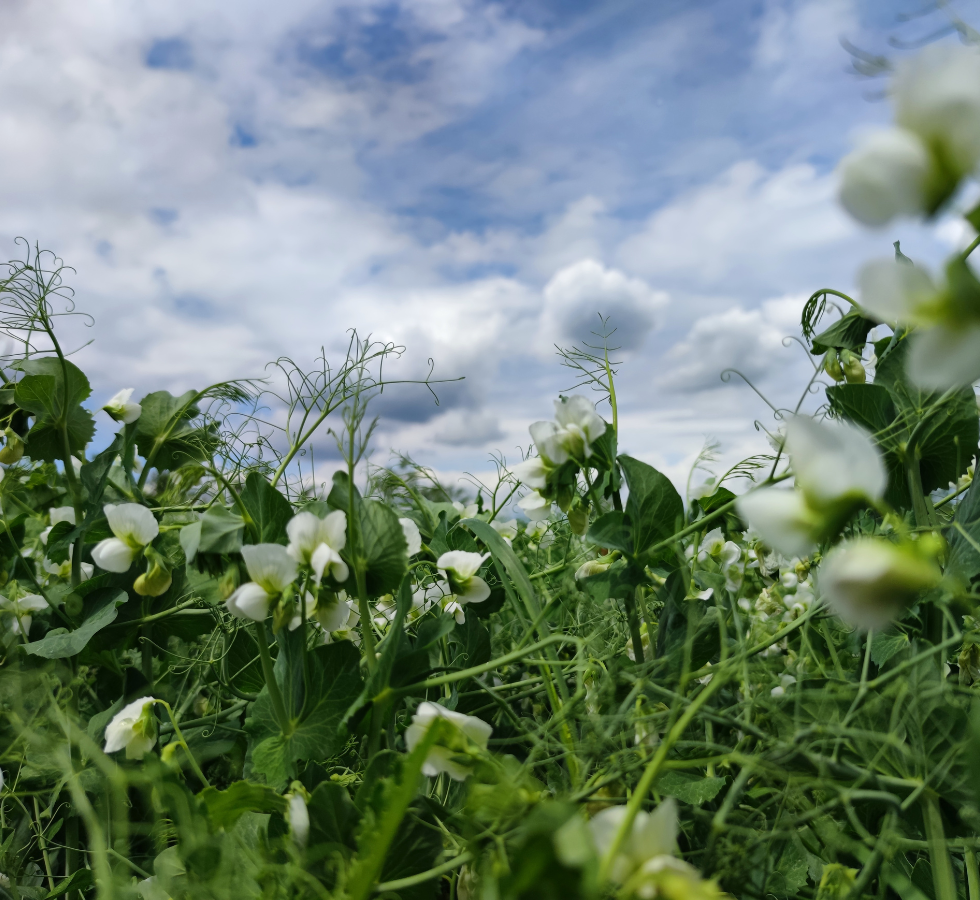How We Tackle Weeds in Organic Chickpeas
June 23, 2025We’re back in the field with our chickpea cultivation series! See how we tackle weeds after emergence using inter-row cultivation.
Read articleAt our organic farm in Novi Kneževac, we are always eager to explore innovative techniques that promote sustainability and enhance our farming practices. In this video, we invite you to join us on an exciting sowing adventure as we plant sunflowers into a pea cover crop.

The timing of sunflower seeding into the pea cover crop is crucial for its success. Seeding is typically performed in the first week of May when the pea plants are in full bloom and possess enough biomass to provide an ample quantity of nitrogen, as well as effective weed control. The thriving pea plants, as members of Leguminosae, act as a natural source of nitrogen, enriching the soil and providing essential nutrients for the sunflowers.
One of the significant advantages of Seeding sunflowers into a pea cover crop is its inherent ability to control weeds. The dense and vigorous growth of the pea plants forms a natural barrier, suppressing weed growth, and so there is no need for synthetic herbicides. Additionally, as the pea plants reach maturity, they contribute a substantial amount of biomass, which aids in weed control by shading out potential weed species.
To further enhance our experiment, we carefully divided the field into two distinct test areas. Half of the pea field was rolled down, flattening the pea biomass, while the other half was mulched, providing a layer of organic material on the soil surface. This division allowed us to compare and assess two different approaches for Seeding sunflowers, while minimizing any mechanical disturbance to the soil.
Seeding sunflowers into the mulched cover crop presented a notable advantage in terms of ease and efficiency. The well-prepared surface provided by the mulch facilitated the Seeding process, ensuring a smooth transition for the sunflower seeds. On the other hand, we anticipated that the rolled crimp cover crop would offer superior weed control. The flattened vegetation acted as a natural barrier, impeding weed growth and reducing competition with the emerging sunflowers.
By implementing these two distinct approaches, we sought to evaluate their respective benefits not only in terms of Seeding convenience and weed management, but also in relation to sunflower yield. Our aim was to uncover the most effective strategy for achieving optimal sunflower growth and yield, while preserving the integrity of the soil structure.
By Seeding sunflowers into the pea cover crop without soil manipulation or tilling, we employ sustainable and organic farming practices. Avoiding tillage helps preserve soil structure, prevent erosion, and maintain soil health. This approach also reduces the release of carbon dioxide into the atmosphere and contributes to mitigating climate change.
Furthermore, the use of cover crops like peas provides multiple benefits. They enrich the soil with nitrogen through biological nitrogen fixation, reducing the need for synthetic fertilizers. Cover crops also enhance soil moisture retention, prevent nutrient leaching, and improve overall soil health and fertility. In addition, these practices support the flourishing of beneficial soil microorganisms that are vital for maintaining soil health and promoting a thriving soil ecosystem.
The Seeding of sunflowers into a thriving pea cover crop represents an exciting and sustainable experiment on our organic farm. By harnessing the nitrogen contribution and weed-fighting abilities of the pea plants, we are fostering a natural and organic approach to nourish our sunflowers while promoting soil health. This innovative technique, combined with our dedication to sustainable farming practices, allows us to cultivate crops while minimizing the environmental impact and preserving the long-term viability of our farm.
To witness our sowing adventure and learn more about our commitment to sustainable and organic farming, watch the video:
We’re back in the field with our chickpea cultivation series! See how we tackle weeds after emergence using inter-row cultivation.
Read articleTwo days, three farms, one shared goal: growing hemp more sustainably. Here’s what we learned and shared during our tour of Prekmurje.
Read articleChickpeas offer great potential for organic farming. Join us as we walk you through the essential steps of chickpea cultivation, starting with seedbed preparation.
Read article